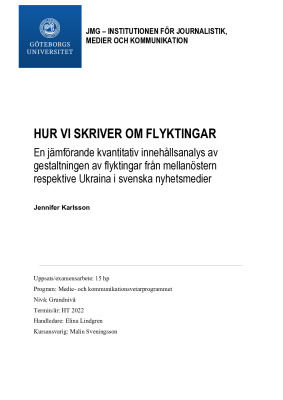HUR VI SKRIVER OM FLYKTINGAR
En jämförande kvantitativ innehållsanalys av gestaltningen av flyktingar från mellanöstern respektive Ukraina i svenska nyhetsmedier
Executive summary
The purpose of this thesis is to examine if there is a difference in the way Swedish news media reports about refugees depending on their nationality. The purpose of this is to examine if popular orientalist
stereotypes and ideas can be found in news articles that are presented as objective. In the paper, two recent waves of refugees coming Sweden are compared; articles about refugees from Ukraine in Sweden from 2022 are compared to articles about Middle Eastern refugees in Sweden from 2015. In order to compare these, a quantitative content analysis was made of 325 articles.
The thesis is based partly on the orientalism theory by Edward Said. In this theory, it is said that the western world has created its own idea of the Middle East which continuously exotifies och dehumanizes middle eastern people. It is also based on framing theory, specifically Druckmans’ idea of framing theory, in which framing is parted into equivalency framing (what way you choose to frame an issue) and emphasis framing (what matter of an issue you choose to emphasize). For this thesis, articles were coded for both emphasis framing and equivalency framing to compare if the Middle East and Ukrainian refugees were framed differently by news media. For equivalency framing, articles could vary from positive, neutral, negative or both. For emphasis framing, a number of themes were chosen, for which each article was coded depending on if it contained the theme or not. These
themes were economy, culture, national safety, crime, integration, distribution, labor market integration, humanitarian, victimization, and other emphasis. With this, the thesis seeks to quantitatively explore if there is a correlation between media framing of refugees and the nationality of said refugees, and if so is the case also contribute to understanding what this correlation may be.
The results show that there is no significant correlation between types of equivalency framing and the nationality of the refugee. That means that neither Ukraine nor the Middle East are systematically portrayed more positively or negatively than the other in Swedish news media. Concerning emphasis framing, the results show that articles about Ukraine usually are around the themes of humanitarian actions, victimization and distribution, while articles about the Middle East are usually about distribution, victimization and integration. All and all, however, the results show no significant correlation between the refugees nationality and the theme of the article, except for two themes. Distribution was significantly more common for articles about the Middle East, while articles about humanitarian action was significantly more important for articles about Ukraine. Concerning a
combination of emphasis and equivalency framing, the results showed no significant correlation. This, however, may be a methodological issue. The amount of analyzed articles is insufficient for an analysis of that size, which made it hard to find sufficient correlations. Because of this, the entirety of the results of this thesis should be generalized mindfully.

